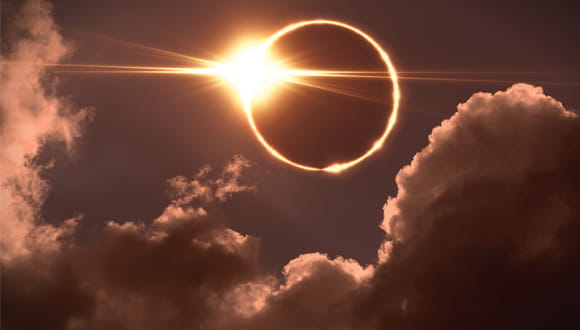How to Protect Your Vision While Watching a Solar Eclipse
March 14, 2024 - Katie McCallumWe're in for a treat this April. A total solar eclipse will be visible to some Americans on Monday, April 8 as its narrow path arcs from central Texas to Maine. Most of the rest of the country will have the chance to view some degree of a partial solar eclipse.
When the sun becomes obscured during a solar eclipse, broad daylight is replaced with an eerie twilight. For astronomy buffs, a solar eclipse is also a time to look at features of the sun that aren't normally visible, like the solar corona, chromosphere and more.
We Houstonians are just outside the path of the total eclipse but will still see a near-total one. Over the course of a few hours, the moon will pass in front of the sun, blocking more than 90% of it from our vantage point in Houston. Many of us enjoyed a similar phenomenon last October, when an annular solar eclipse blocked around 80% of the sun to display its "ring of fire."
"Different this time is that vision safety will be an even more important message to stress to Houstonians. Since the sun will be more occluded, there will be more of a temptation to stare at it without protection," says Dr. Rahul Pandit, an ophthalmologist at Houston Methodist. "An eclipse is an event no one should miss, but it can be dangerous. The sun's visible light will be blocked by the moon, which allows viewers a chance to actually stare at the sun. However, the other wavelengths of light, such as infrared rays, are still able to reach and burn the retina of the eyes. This can cause serious damage within minutes."
In fact, looking at the sun can permanently damage your retina — the layer of the eye that senses light and relays that information to the brain — and even lead to blindness in extreme cases.
How to protect your vision while watching a solar eclipse
Many of us will head outside to watch the eclipse, but know that you should never look at the sun without proper protection — even when it's mostly eclipsed by the moon. Eye protection is key. And even your most expensive pair of sunglasses won't help. You'll need some special supplies, and you'll also need to be sure you're using those supplies correctly.
"Those planning to travel further west to San Antonio or Austin will have a neat opportunity to briefly take off their eclipse glasses during the few minutes of the total eclipse," says Dr. Pandit. "But those glasses must be worn before and after that special part of the total eclipse experience."
Here are Dr. Pandit's tips for safely viewing a solar eclipse:
- Purchase ISO 12312-2 compliant eclipse glasses. These glasses contain solar filters that not only reduce visible sunlight to safe and comfortable levels but also block solar UV and IR radiation.
- Purchase a pair of ISO 12312-2 compliant solar binoculars. More expensive than eclipse glasses, but astronomy buffs might find this a worthwhile investment.
- Equip binoculars and telescopes with ISO 12312-2 compliant solar filters. A solar filter must always be the first thing sunlight passes through. Never look at the sun through an unfiltered pair of binoculars or telescope — even if you're wearing eclipse glasses. The American Academy of Ophthalmology recommends talking with an expert astronomer before using a special solar filter on a camera, telescope, binoculars or any other optical device.
- Protect your eyes for the entirety of a partial eclipse. No matter how much of the sun gets blocked here in Houston, you must wear eclipse glasses or use solar filters for the entirety of a partial solar eclipse. Worth a second reminder: Never look at the sun through an unfiltered pair of binoculars or telescope — even if you're wearing eclipse glasses. A solar filter must always be the first thing sunlight passes through.
- For those in the path of totality, only remove your eclipse glasses when the sun is completely blocked. For the brief total phase of the eclipse, which only happens in the path of totality, the sun is about as bright and just as safe to look at as a full moon, according to the American Astronomical Society. At all other times, you should wear eclipse glasses or use solar filters to view the eclipse.
- Don't use damaged eclipse glasses or solar filters. If you're using supplies that have been stored in the back of a closet since the last eclipse, be sure to inspect the integrity of the solar filter before use. If there are any scratches, tears or punctures, discard it.
- Don't let kids watch a solar eclipse alone. Parents should make sure children understand the risks of looking at the sun without solar protection and supervise them if they're using eclipse glasses.
"I'm looking forward to viewing this year's eclipse with my family, but it's important to ensure we're viewing it safely as well," adds Dr. Pandit.
You can check the American Astronomical Society's website or a list of suppliers of safe solar filters and viewers.








